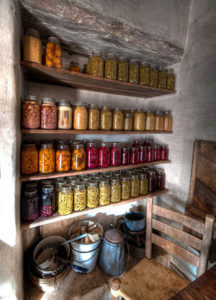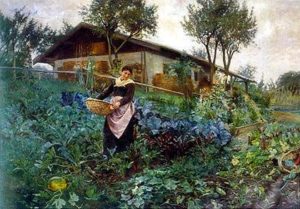Preserve Us, Lord
Before I get out of bed most days, I (sleepily and silently) say this short traditional collect from the Anglican Book of Common Prayer’s form of morning prayer:
Lord God, almighty and everlasting Father, you have brought us in safety to this new day. Preserve us with your mighty power, that we many not fall into sin, nor be overcome by adversity; and in all we do, direct us to the fulfilling of your purpose, through Jesus Christ our Lord. Amen.
 Recently, to my dismay, whenever I say the phrase “preserve us” an incongruous image springs irresistibly to mind: my grandmother’s fruit cellar. Row on gleaming row of bottled plums, spiced peaches, chutney, green beans and tomatoes and corn, strawberry jam and grape jelly, glowing like jewels in the light of the single electric light bulb in the ceiling.
Recently, to my dismay, whenever I say the phrase “preserve us” an incongruous image springs irresistibly to mind: my grandmother’s fruit cellar. Row on gleaming row of bottled plums, spiced peaches, chutney, green beans and tomatoes and corn, strawberry jam and grape jelly, glowing like jewels in the light of the single electric light bulb in the ceiling.
This involuntary linking of the petition to “preserve us” with a memory of jam jars in a basement was mortifying. How frivolous of my unruly brain, I thought, to intrude a kind of visual pun on my waking prayer: how irreverent and irrelevant. But the more I tried to avoid the association the more persistent it became. So I began to wonder what it might mean. And as I rummaged in my mind for the connection, I have come to see that it is neither irrelevant nor irreverent at all.
When as a child I was sent down to the fruit cellar to fetch cherry jam for breakfast or runner beans for supper, my admiration for the beauty and order of the packed rows of jars was grounded in personal knowledge of the huge labor that had gone into them. A whole summer had been salvaged; an entire harvest rescued from worm and frost and weed and waste, in long hard days in garden and kitchen.
To my young eye, the preparations for a canning day were awesome in their ritual severity: the grandmothers (my mother’s mother and her mother) wrapped in spotless aprons, the kitchen table scrubbed to whiteness, the glass jars sterilized to a surgical standard, timers checked, knives sharpened, the sacrifice itself—whatever was perfectly ripe that week—scrutinized, selected, washed, prepared. Unassuming Lutheran women were suddenly vested with the gravity and assurance of priests: lifting dripping racks of sterile jars from clouds of steam, stirring kettles, judiciously adding salt and vinegar and sugar, finally filling the jars and sealing them.
But what has this to do with prayer?
The word “preserve” itself of course is key. To preserve means to save—to keep safe from harm, to rescue from destruction. The “saving” of fruits and vegetables that the grandmothers (like countless women before them) undertook each summer fed the family all winter: it was important work, demanding skill and risk and patience. For all its no-nonsense practical seriousness, it was also—indeed primarily—an act of love: love understood not as something wonderful we feel but something difficult we do.
All of this, I realize now, lies just below the surface of that involuntary linking of my adult prayer and the childhood memory.
Thanking God for bringing us safely to a new day—asking Him to “preserve” us from sin and adversity that we may be useful to His purposes—reveals the whole labor-intensive love-infused enterprise stored up in my grandmother’s fruit cellar to be an apt and powerful image of the saving love of God.
In the first place, the comparison reminds us that we do not save ourselves, any more than the produce of my grandmothers’ garden made its own way into kettle and jar. It is only God’s steadfast love and faithfulness that “continually preserve” us (Psalm 40:11); the Lord alone will deliver us from evil and “preserve us for heaven” (2 Timothy 4:18). It is utterly beyond our power to achieve our own salvation.
At the same time, we are in urgent need of being saved. If we stay as we are, we will have been planted and tended in vain, forfeit to death, as surely as the tomatoes in my grandmothers’ garden would have rotted if they had been left on the vine. My grandmothers kept their garden watered and weeded and safe from harm not for the benefit of marauding rabbits or for the plants’ own pleasure, but to fulfill their own sustaining purposes: to feed their family and neighbors.
So it is with us. The purpose of human life (as the Westminster Catechism puts it) is “to glorify God and enjoy Him forever”—not, contrary to the assumptions of popular culture, to glorify and enjoy ourselves. As Evelyn Underhill once rather tartly reminded a friend (who seems to have been unhappily preoccupied with her own imperfections), “the object of your salvation is God’s glory, not your happiness.” Enlarging the agricultural metaphor, C.S. Lewis suggests that “we are like eggs at present,” and we cannot go on indefinitely just being eggs: “We must be hatched or go bad.”
 The salvation unto eternal life that God intends for us will involve our being radically changed: “hatched” like eggs, plucked like fruit from the orchard, dying to one nature that we might be born to another. Jesus reminds us that only if a grain of wheat falls into the earth and dies will it bear fruit (John 12:24). And if that wheat is not harvested—cut and winnowed and ground—of what value is its life? When we ask God to “preserve us” from sin and adversity that we might fulfill His purpose for our lives, we are asking God to transform us and use us: as wheat is changed to bread and grapes to wine.
The salvation unto eternal life that God intends for us will involve our being radically changed: “hatched” like eggs, plucked like fruit from the orchard, dying to one nature that we might be born to another. Jesus reminds us that only if a grain of wheat falls into the earth and dies will it bear fruit (John 12:24). And if that wheat is not harvested—cut and winnowed and ground—of what value is its life? When we ask God to “preserve us” from sin and adversity that we might fulfill His purpose for our lives, we are asking God to transform us and use us: as wheat is changed to bread and grapes to wine.
Unlike the produce of my grandmothers’ garden, plucked and peeled and boiled and strained without its knowledge or consent, we are privileged to participate in our own transformation. By the grace of God, we may (and in this morning prayer we do) say an ever-deeper yes to God’s “mighty power” and mysterious purposes. We may—indeed we must—continuously offer ourselves to whatever discipline and suffering that regeneration and sanctification will require. Cardinal Newman, knowing that he must be transformed if he hoped to see God, prayed: “O support me as I proceed in this great, awful, happy change.”
Our Incarnate, Crucified and Risen Lord does indeed support us as we surrender to being made new, part of the “new creation” (2 Corinthians 5:17). Christ himself sets us free from our bondage to decay (Romans 8:21). By his death and resurrection, he is both the model for perfect obedience and trust in God, even unto death, and the means by which we too can hope to enjoy God forever, and participate in the saving of the world God loves.
These are great matters, almost too much to grasp, glory that dazzles us.
Perhaps that is why my grandmother’s fruit cellar has become for me, in all of its rootedness in domestic “ordinary time,” a consoling image of the household of God: rank on rank of the “preserved,” the rescued, changed from one nature to another by means of water and fire, set apart in love for the sustaining of the family, the neighborhood, the world.

